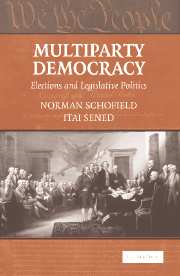Crossref Citations
This Book has been
cited by the following publications. This list is generated based on data provided by Crossref.
Schofield, Norman
2006.
Equilibria in the spatial stochastic model of voting with party activists.
Review of Economic Design,
Vol. 10,
Issue. 3,
p.
183.
Adams, James
Clark, Michael
Ezrow, Lawrence
and
Glasgow, Garrett
2006.
Are Niche Parties Fundamentally Different from Mainstream Parties? The Causes and the Electoral Consequences of Western European Parties' Policy Shifts, 1976–1998.
American Journal of Political Science,
Vol. 50,
Issue. 3,
p.
513.
Schofield, Norman
2007.
The Mean Voter Theorem: Necessary and Sufficient Conditions for Convergent Equilibrium.
The Review of Economic Studies,
Vol. 74,
Issue. 3,
p.
965.
Linhart, Eric
2007.
Rationales Wählen als Reaktion auf Koalitionssignale am Beispiel der Bundestagswahl 2005.
Politische Vierteljahresschrift,
Vol. 48,
Issue. 3,
p.
461.
Schofield, Norman
2007.
Political equilibria with electoral uncertainty.
Social Choice and Welfare,
Vol. 28,
Issue. 3,
p.
461.
Schofield, Norman
and
Miller, Gary
2007.
Elections and Activist Coalitions in the United States.
American Journal of Political Science,
Vol. 51,
Issue. 3,
p.
518.
Abney, Ronni
Morrison, Andrea
and
Stradiotto, Gary
2007.
THE STABILITY OF REPRESENTATION: A CROSS‐NATIONAL ANALYSIS OF PARTY POLICY DISPERSION.
Representation,
Vol. 43,
Issue. 3,
p.
151.
Barkin, David
2008.
Books Received.
Review of Radical Political Economics,
Vol. 40,
Issue. 1,
p.
134.
Schofield, Norman
2008.
Power, Freedom, and Voting.
p.
259.
De Sinopoli, Francesco
and
Iannantuoni, Giovanna
2008.
Extreme voting under proportional representation: the multidimensional case.
Social Choice and Welfare,
Vol. 30,
Issue. 3,
p.
401.
Schofield, Norman
2008.
The New Palgrave Dictionary of Economics.
p.
1.
Ferris, J. Stephen
Park, Soo-Bin
and
Winer, Stanley L.
2008.
Studying the role of political competition in the evolution of government size over long horizons.
Public Choice,
Vol. 137,
Issue. 1-2,
p.
369.
Miller, Gary
and
Schofield, Norman
2008.
The Transformation of the Republican and Democratic Party Coalitions in the U.S..
Perspectives on Politics,
Vol. 6,
Issue. 3,
p.
433.
ROSAS, GUILLERMO
and
SHOMER, YAEL
2008.
Models of Nonresponse in Legislative Politics.
Legislative Studies Quarterly,
Vol. 33,
Issue. 4,
p.
573.
TAVITS, MARGIT
2008.
The Role of Parties' Past Behavior in Coalition Formation.
American Political Science Review,
Vol. 102,
Issue. 4,
p.
495.
Arena, Philip
2008.
Success Breeds Success? War Outcomes, Domestic Opposition, and Elections.
Conflict Management and Peace Science,
Vol. 25,
Issue. 2,
p.
136.
Adams, James
and
Merrill, Samuel
2008.
Candidate and Party Strategies in Two‐Stage Elections Beginning with a Primary.
American Journal of Political Science,
Vol. 52,
Issue. 2,
p.
344.
MERSHON, CAROL
2008.
Legislative Party Switching and Executive Coalitions.
Japanese Journal of Political Science,
Vol. 9,
Issue. 3,
p.
391.
EZROW, LAWRENCE
2008.
Research Note: On the inverse relationship between votes and proximity for niche parties.
European Journal of Political Research,
Vol. 47,
Issue. 2,
p.
206.
Linhart, Eric
2009.
Jahrbuch für Handlungs- und Entscheidungstheorie.
p.
181.





